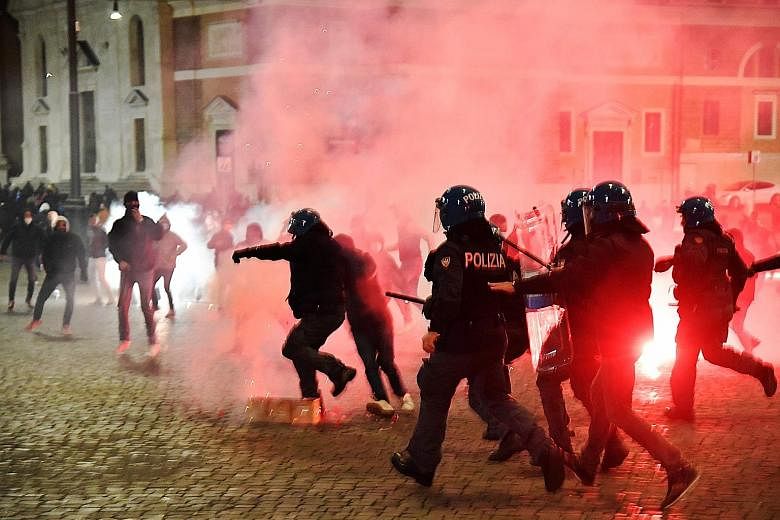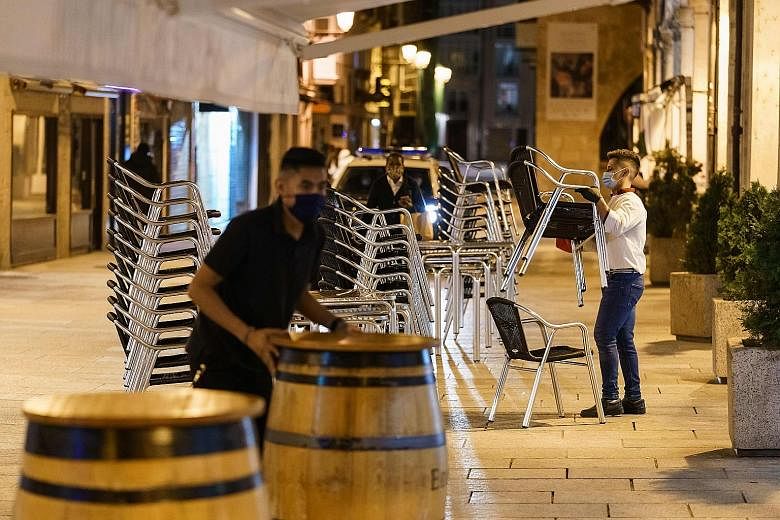ROME/MADRID • Italy has introduced the strongest coronavirus restrictions since the end of a national lockdown in May, and Spain will impose a national curfew as cases surge in the two countries at the epicentre of the initial wave of the pandemic in Europe.
In Italy, Prime Minister Giuseppe Conte yesterday approved a plan to limit opening hours for bars and restaurants, and shut entertainment, gambling venues and gyms. Italians will also be urged not to travel.
The measures will begin today and remain in effect until Nov 24.
Mr Conte said the measures are aimed at protecting both public health and the economy and should allow the rising curve of the epidemic to be brought under control in the next few weeks.
"We think that we will suffer a bit this month but by gritting our teeth with these restrictions, we'll be able to breathe again in December," he told a news conference.
Over in Spain, Prime Minister Pedro Sanchez's Cabinet yesterday approved a new state of emergency that will give the central government more powers, and he announced that the government planned a national curfew from 11pm to 6am, except in the Canary Islands, where the coronavirus infection rate is low.
The state of emergency will need parliamentary approval to last beyond 15 days. Mr Sanchez has asked for Parliament to approve its extension up to May 9.
"The situation we are going through is extreme," he said in a televised address following the Cabinet meeting convened to discuss the crisis.
The emergency measures come in response to calls from the regions for powers to impose curfews to fight the surge in coronavirus cases, after Spain last Wednesday became the first European country to record more than a million cases of the virus.
Italy and Spain had managed to tamp down the initial wave of infections with some of the world's strictest national lockdowns.
However, the easing of those measures before the summer travel season contributed to a new wave of cases that risks overwhelming the countries' healthcare systems if unchecked.
More than 70,000 people have lost their lives from the virus in the two countries, accounting for over a third of all deaths recorded in Europe, excluding Russia.
The World Health Organisation (WHO) has warned of an "exponential" rise in infections threatening health systems' ability to cope with a second wave of cases, testing many nations that appeared to have the virus under control earlier this year.
Mr Sanchez last week signalled that infections in Spain may be much more pervasive than the official data shows.
More than three million people in Spain have caught the virus, he said last Friday, a figure some three times higher than official numbers.
Total cases rose to 1,046,132 last Friday, while the death toll is nearing 35,000.
For his part, Mr Conte has repeatedly ruled out a new national lockdown in Italy, but he is running out of options as less restrictive measures have failed to curb the latest spread.
New infections rose to a record 19,644 last Saturday and there are now more than 1,100 people being treated for the virus in intensive care units.
The Italian government may also adopt new support measures to limit the economic impact of the virus, Finance Minister Roberto Gualtieri said.
The government is considering a €4 billion to €5 billion (S$6.4 billion to S$8 billion) emergency decree to help workers by extending furloughs and banning dismissals, according to people familiar with the matter.
Meanwhile, in France, the government has extended an overnight curfew to cover areas home to around 46 million people - two out of every three French.
"The difference compared with the first wave is that now we also have all the chronic pathologies of the winter period to take care of," emergency doctor Agnes Ricard-Hibon told local television.
Prime Minister Jean Castex said last Saturday that another €700 million would be made available to help poor people who have been hit hardest by the pandemic.
Last Friday, WHO chief Tedros Adhanom Ghebreyesus warned that "too many countries are seeing an exponential increase in Covid-19 cases and that is now leading to hospitals and intensive care units running close to or above capacity".
He added: "We urge leaders to take immediate action to prevent further unnecessary deaths."
Across the world, the pandemic has now claimed the lives of 1.1 million people and infected more than 42 million, with the WHO warning that the northern hemisphere was at an especially critical juncture.
The WHO's message for nations to do more has been echoed by the European Centre for Disease Prevention and Control, but moves to reintroduce restrictions were met with protest in parts of the continent.
BLOOMBERG, REUTERS, AGENCE FRANCE-PRESSE












